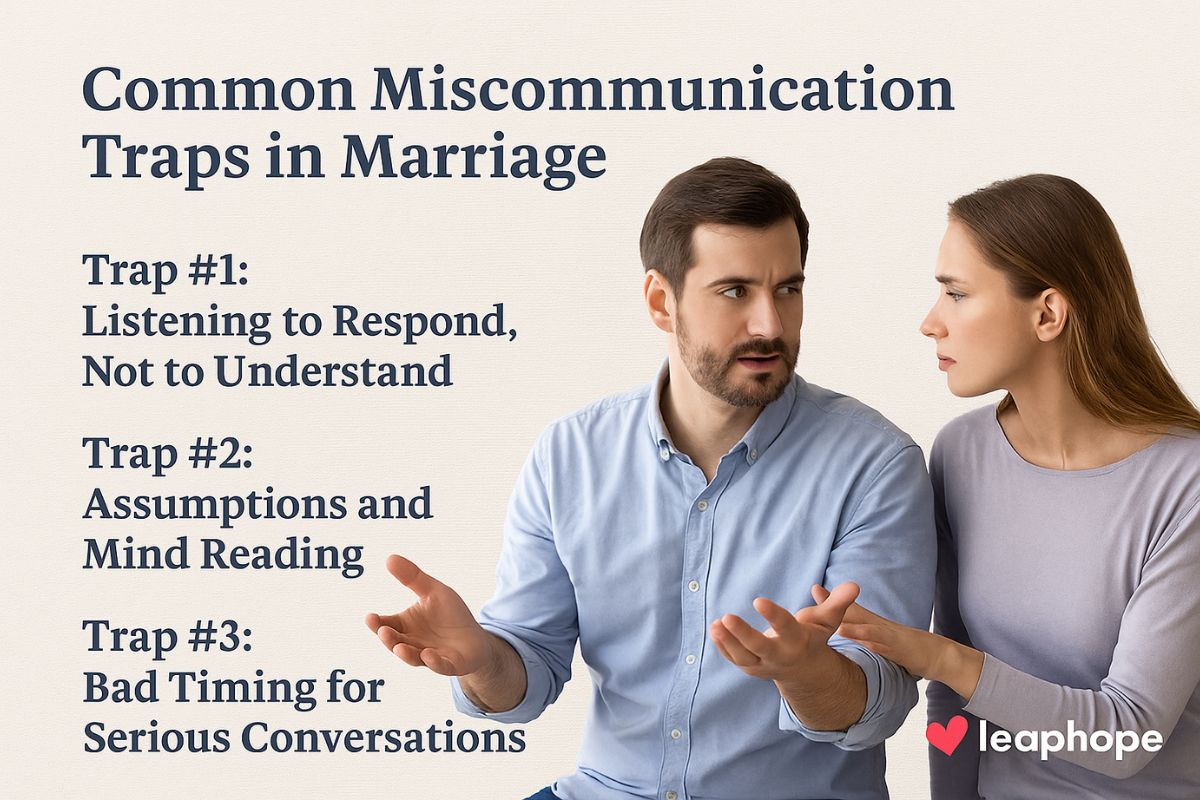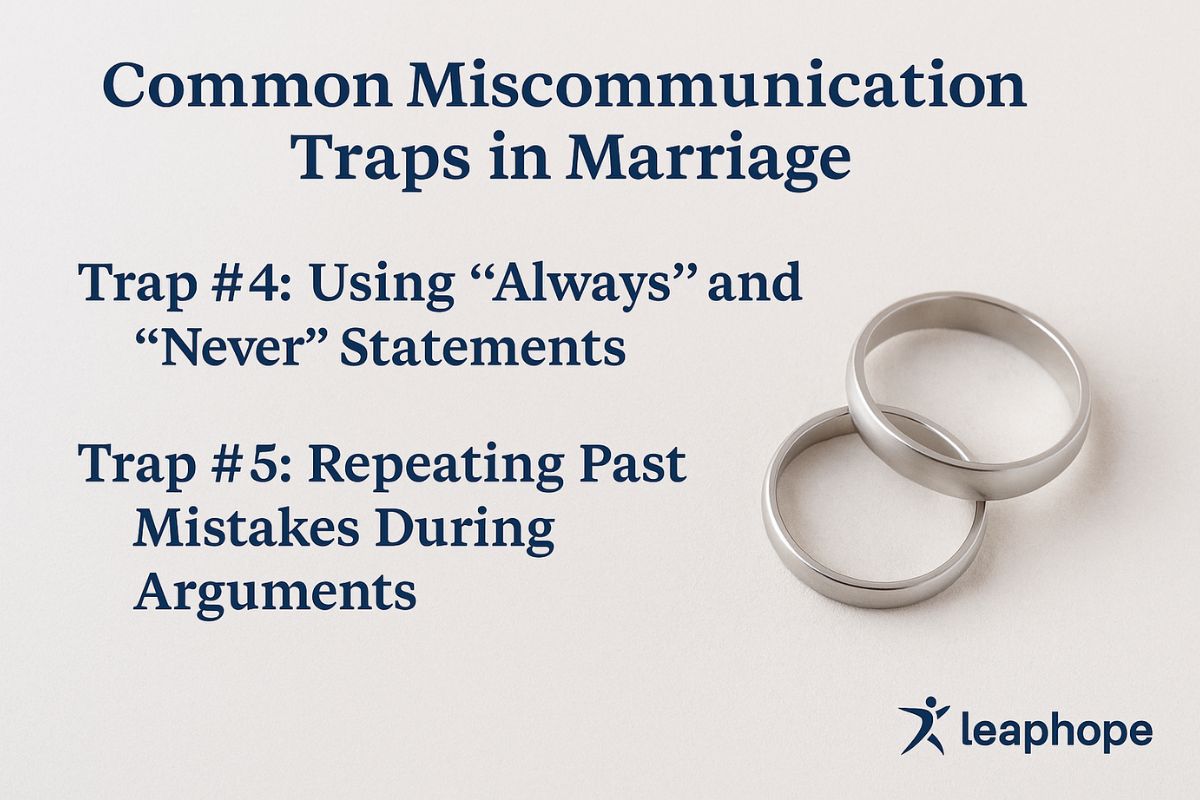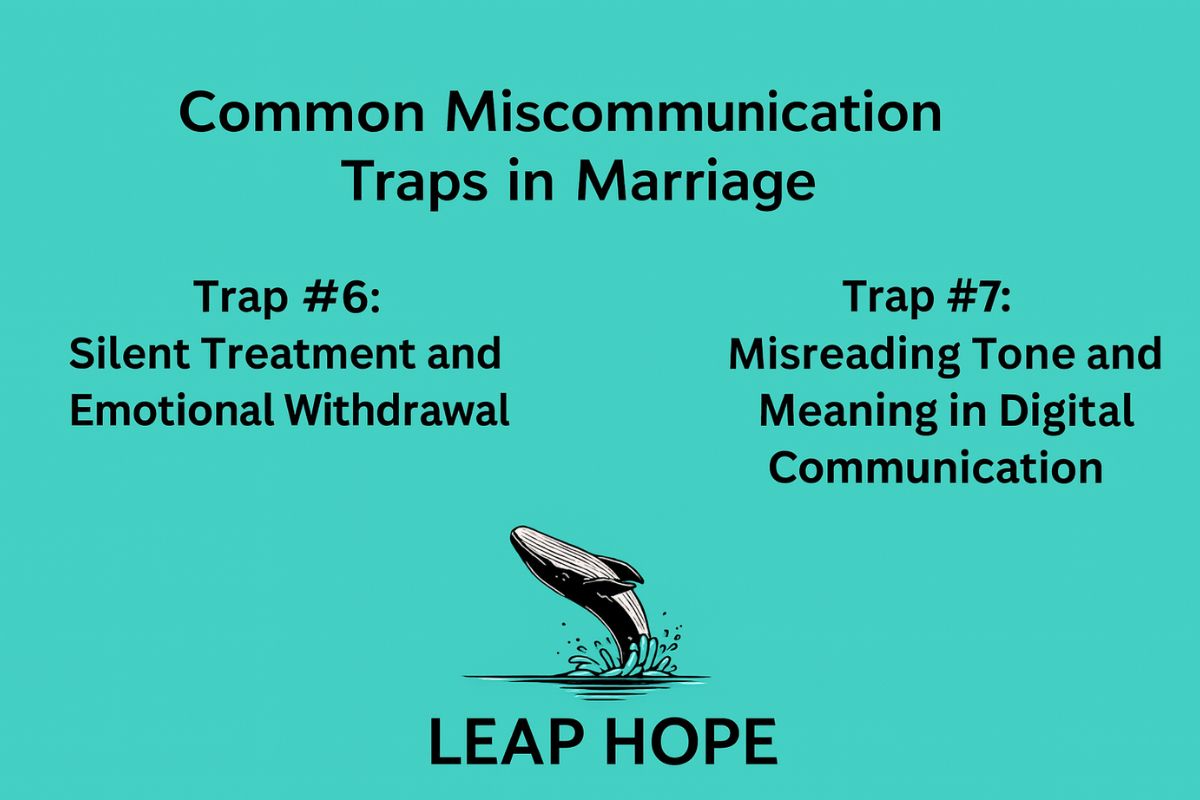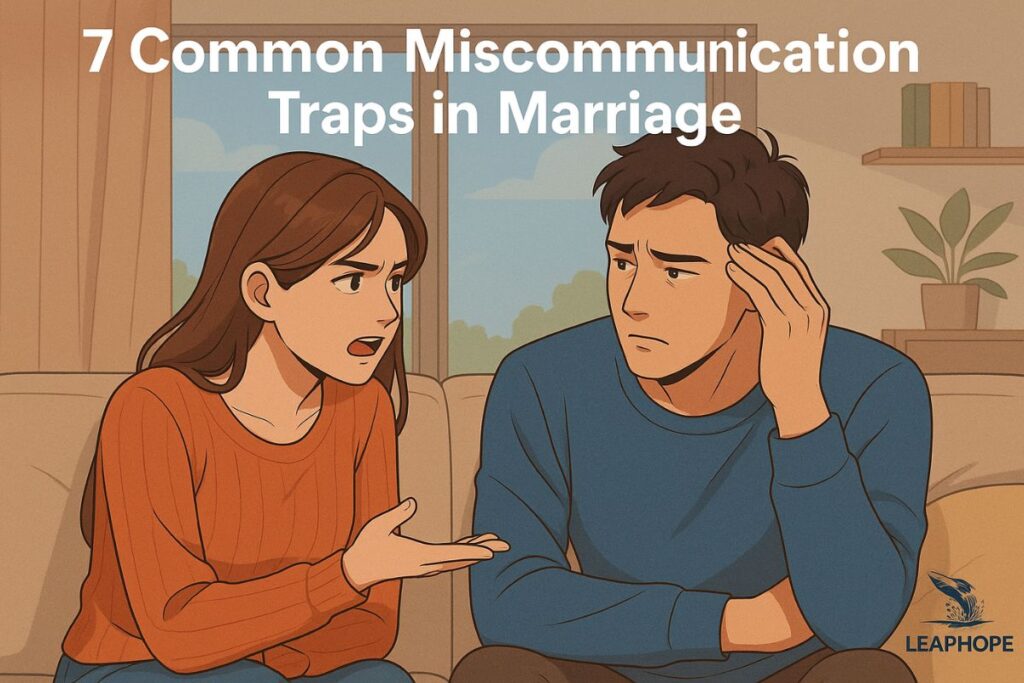Miscommunication in marriage doesn’t happen because you don’t love each other or don’t know how to talk.
It happens because, in emotionally charged moments, the mind shifts into protection mode instead of connection.
You and your partner probably talk every day. About work, plans, money, and family. From the outside, it looks like communication exists. Yet during arguments, things spiral. Words land wrong. Old issues surface. You’re left feeling unheard or blamed, even when nothing serious was wrong before.
This isn’t about intelligence or effort. Many caring, emotionally aware couples fall into the same patterns. Not because they want to hurt each other, but because everyday conversations trigger emotions faster than logic can catch up.
Miscommunication rarely starts with silence. It starts when you’re still talking, but no longer feeling understood. When one comment carries more weight than it should. When a small moment turns heavy without warning.
This article isn’t about fixing your marriage or offering communication tips. It’s about recognising the common miscommunication traps that show up in real, day-to-day interactions, even in stable, loving relationships.
If you’ve ever wondered, “Why did that conversation turn into this?”
You’re not alone, and this will likely feel familiar.
Common Miscommunication Traps in Marriage Even Strong Couples Keep Falling Into
These are not communication problems that come from neglect or lack of love. They show up in everyday conversations, during moments that don’t seem serious at first.
You’re still talking. You’re still trying. Yet something keeps getting lost between what’s said and what’s heard.
The traps below are not about silence or avoidance. They happen while you’re still talking, still trying, and still invested.
Trap 1: Listening to Respond, Not to Understand
You’re listening, but your focus is already on your reply.
While your partner is speaking, your mind is busy. You’re correcting details. Preparing your defence. Waiting to explain yourself. By the time they finish, you’ve missed what they were really trying to say.
This usually happens when something feels personal. Even a small comment can trigger the need to protect yourself. The goal shifts from understanding them to making sure you’re not misunderstood.
You see it in small moments. Interrupting. Adding context too quickly. Saying, “That’s not what I meant,” before they’re done. On the surface, the conversation continues. Underneath, you’re already talking past each other.
Both people end up feeling unheard. Your partner feels dismissed. You feel misrepresented. The conversation becomes about explaining, not understanding.
This doesn’t mean you’re bad at listening. It means your mind chose protection over connection.
That’s how miscommunication starts, even when you’re still talking.

Trap #2: Filling in the Gaps With Assumptions
You rarely react to exactly what your partner says.
You react to what you think they mean.
A pause feels like disinterest. A short reply feels like anger. A neutral comment sounds critical. Before checking, your mind fills in the gaps. And once you believe the meaning, your response follows it.
This happens fast. Past arguments, old hurt, and emotional memory step in. You’re no longer responding to the present moment. You’re responding to what this reminds you of.
You might notice yourself saying things like, “I know what you’re implying,” or “You always think that about me.” Your partner feels misunderstood. You feel attacked. Neither of you is reacting to the actual words anymore.
What makes this trap powerful is that it feels convincing. The meaning you assign feels real. But it’s built on assumption, not confirmation.
This doesn’t mean you’re overreacting or imagining things. It means your mind is trying to protect you from being hurt again.
That’s how misunderstanding grows in marriage, even when nothing was meant the way it was heard.
Trap #3: Starting Serious Conversations at the Worst Possible Time
Sometimes the problem isn’t what you say.
It’s when you say it.
You bring something up when your partner is already tired or distracted. It might be about money. A family issue. A shopping list that turned into an argument. An unexpected plan or trip you mention casually. You don’t plan to start a fight, but the timing shifts everything.
A practical concern suddenly feels heavy. A neutral question sounds like pressure. Your partner reacts defensively, not because the topic is wrong, but because they don’t have the emotional space to deal with it right then.
You might think, “I was just trying to talk.”
They might think, “Why are we doing this now?”
Nothing was wrong yesterday. The words aren’t harsh. But the moment is already stretched thin.
That’s why small topics sometimes explode.
Not because of what was said, but because of when it was said.
Trap #4: Turning One Moment Into a Pattern (“Always” and “Never”)
One small moment suddenly becomes a verdict on the whole relationship.
A missed call turns into “you never listen.” One mistake becomes “you always do this.” The argument stops being about what just happened and starts feeling like a pattern that can’t be escaped.
This usually happens when frustration has been sitting quietly for a while. The mind reaches for words that match the feeling, not the facts. “Always” and “never” come out because they express how heavy it feels, not because they’re true.
Your partner doesn’t hear the hurt underneath. They hear blame. They defend themselves. You feel even less understood.
Now you’re no longer talking about one moment. You’re fighting a version of the relationship that feels unfair to both of you.
This doesn’t mean you’re exaggerating on purpose. It means emotions are trying to be seen, and language stretches to carry them.
That’s how conversations escalate, even when they start small.

Trap 5: Letting Old Conversations Spill Into New Ones
You start talking about one thing.
Somehow, you end up talking about five.
An argument that begins with a small issue slowly fills with older moments. Things you thought were over. Comments you brushed aside at the time. Situations you told yourself weren’t worth bringing up. They all show up at once.
This usually isn’t planned. Your mind connects the present moment to similar past feelings. Before you realise it, you’re not reacting just to what happened today. You’re reacting to the emotional weight of everything that felt unresolved.
Your partner feels blindsided. You feel justified. Both of you feel overwhelmed.
You might think, “Why does every conversation turn into this?”
They might think, “Why are we talking about the past again?”
It’s exhausting because nothing feels clean. Every discussion carries extra meaning. Every disagreement feels heavier than it should.
This doesn’t mean you’re holding grudges on purpose. It means certain feelings never found space earlier, and arguments become the only place they surface.
That’s how the past quietly takes over the present, even when you’re trying to move forward.
According to the Gottman Institute, stonewalling is one of the “Four Horsemen” of relationship breakdown, and when left unaddressed, it significantly raises the risk of divorce. Learn more about the Four Horsemen here.
Trap 6: Talking to Be Right, Not to Be Understood
At some point, the conversation stops being about connection.
It becomes about being right.
You start explaining your logic. Laying out facts. Pointing out inconsistencies. You’re not trying to hurt your partner. You’re trying to make your side make sense. But the more you explain, the further away they feel.
Your partner isn’t listening for logic in that moment. They’re listening for whether you understand how they feel. When that doesn’t land, they feel dismissed. When they react emotionally, you feel unfairly accused.
Now both of you feel invalidated.
This often happens when one person is speaking from emotion and the other from reason. Neither approach is wrong. But when they clash, it creates distance instead of clarity.
You might leave the conversation thinking, “I explained everything clearly.”
They leave thinking, “They didn’t get me at all.”
This trap hurts because it feels productive while it’s happening. Words are flowing. Points are being made. But understanding isn’t actually growing.
This doesn’t mean you care more about winning than your partner. It means your mind reached for logic as a way to regain control when emotions felt messy.
That’s how conversations turn into debates, even when both people just want to feel understood.

Trap 7: Misreading Tone and Meaning in Digital Conversations
A short message can undo an entire day.
A delayed reply feels intentional. A full stop sounds cold. A simple “okay” feels loaded. Without tone, facial expression, or context, your mind fills in the blanks.
You start rereading the message. Wondering what it really means. By the time you respond, you’re already reacting to a story you’ve built in your head.
Your partner often has no idea this is happening. To them, it was just a message sent quickly. To you, it felt dismissive or distant.
This gets worse when there’s already stress or unresolved tension. Digital conversations become a place where assumptions multiply. Small misunderstandings grow quietly, without either of you noticing in the moment.
You might think, “Why does texting make everything worse?”
They might think, “It was just a message.”
Nothing dramatic happened. No harsh words were used. Yet the emotional impact feels real.
This doesn’t mean you’re overthinking or too sensitive. It means digital communication removes the human cues your mind relies on to feel safe.
Why Miscommunication Happens in Marriage Even When Love Is Still There
Miscommunication in marriage doesn’t mean the relationship is failing.
It often means emotions are moving faster than understanding.
Conversations Trigger Protection, Not Intention
During arguments, the mind shifts into defence mode. You’re not focused on what your partner is trying to say. You’re focused on protecting your intent and your feelings.
That’s why couples can talk often and still feel misunderstood.
Yesterday Can Be Fine, and Today Still Explode
Nothing may have been wrong yesterday. But unspoken frustration doesn’t disappear. It stays stored. When a conversation touches something familiar, the emotional load comes out together.
This is when misunderstandings in communication start to pile up.
You React to More Than the Present Moment
When arguments escalate, it’s rarely about just one issue. Past moments, similar feelings, and unresolved emotions quietly shape how words are heard.
That’s why reactions sometimes feel bigger than the situation.
Talking Is Not the Same as Feeling Understood
Many couples think miscommunication only happens when people stop talking. In reality, it often happens while conversations are still ongoing.
You’re speaking, but not feeling heard. That’s very different from emotional silence, which is explored in No Communication Is Killing Your Marriage.
Stress Shrinks Emotional Space
Stress, family pressure, money concerns, and mental fatigue reduce patience. When emotional space shrinks, communication problems in marriage show up in ordinary moments, not just during big fights.
Over time, repeated misunderstandings can slowly create distance, even when love is still there. If this pattern feels familiar, Lack of Communication in Marriage looks at how that distance develops.
This doesn’t mean your relationship is broken.
And it doesn’t mean you’re doing something terribly wrong.
It usually means emotions showed up faster than either of you expected. When that happens, conversations stop being clean and start getting messy. Seeing that for what it is won’t magically fix things, but it can stop you from blaming yourself or reading too much into every argument.
Final Thought
Miscommunication in marriage doesn’t usually come from lack of love. It comes from reacting while carrying stress, old feelings, and expectations into the same conversation.
Some people talk more. Others pull back. Men and women often respond differently, but both end up feeling misunderstood.
When the same patterns keep repeating, it can help to slow conversations down in a space where nothing has to be defended or explained away. Online marriage counselling offers that space, helping couples understand what’s actually being heard.
Sometimes, better communication in marriage isn’t about saying more.
It’s about finally being understood.
FAQs About Miscommunication in Marriage
What is miscommunication in marriage?
Miscommunication in marriage happens when partners talk but don’t feel understood. Words are exchanged, but meaning gets distorted because of assumptions, timing, emotional reactions, or past experiences influencing the conversation.
Why does miscommunication happen even when couples love each other?
Miscommunication happens because love doesn’t stop stress, emotional memory, or defensive reactions. During sensitive moments, people react to feelings underneath the conversation, not just the words being said.
Is miscommunication the same as lack of communication?
No. Lack of communication is about silence or avoidance. Miscommunication happens while couples are still talking, explaining, and engaging, but meaning keeps getting lost between what’s said and what’s heard.
Why do couples fight over small things so often?
Couples fight over small things because those moments often carry unresolved emotions from earlier interactions. The issue looks small, but the reaction usually isn’t about just that moment.
Can miscommunication affect men and women differently?
Yes. Men and women often respond to miscommunication in different ways. Some try to explain or defend their point. Others withdraw or feel emotionally dismissed. Both experiences can exist at the same time and still lead to feeling misunderstood.




